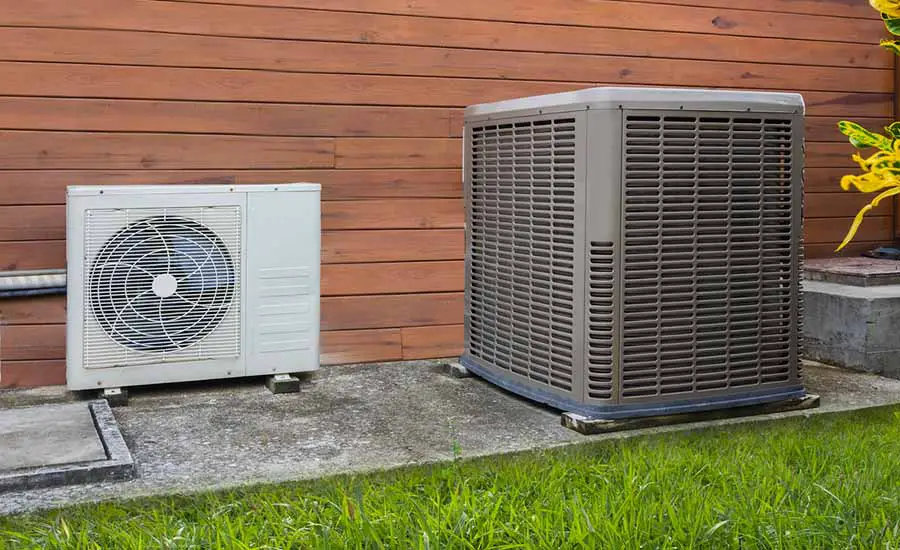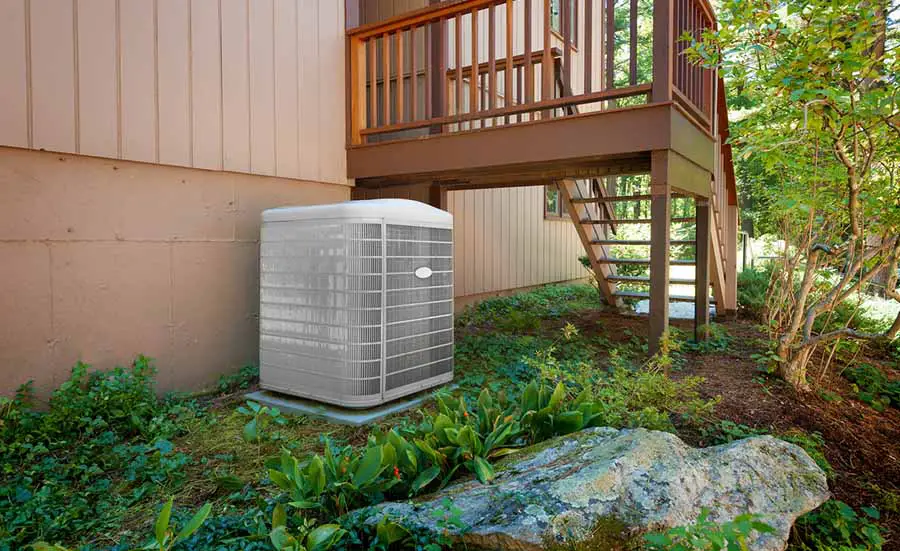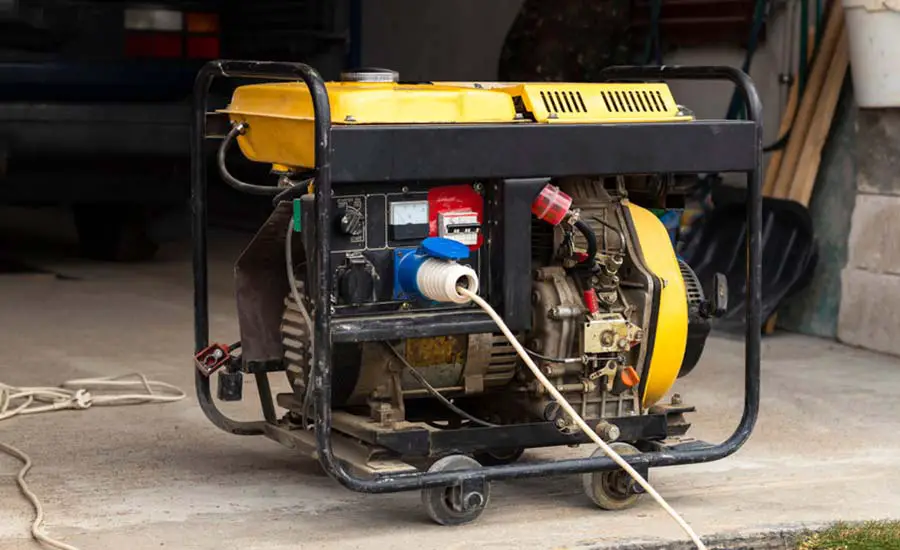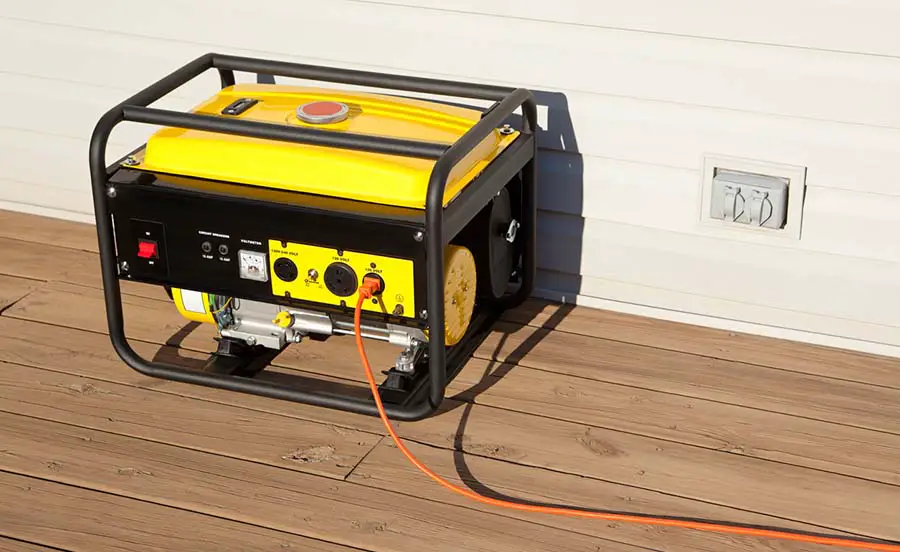
A portable generator is critical in a home during a power outage. You can move it from one point to another, making it versatile in use. It will also power most household appliances. But the big question is whether the portable generator can run a heat pump or an AC unit?
You can run a heat pump on a generator, but most portable generators are not powerful enough for the task. Portable generators produce between 500 and 7,000 watts, while a typical residential heat pump requires 10,000 to 15,000 watts. Portable generators can only handle very small heat pump systems.
There are several things about generator size that you need to get right regarding their use with HVAC systems. We will expound on everything you would like to know about portable generator sizing. Therefore, read on for further elaborate insights on this topic.
Can Your Portable Generator Support a Heat Pump?
A portable generator will efficiently run an HVAC as long as it is the correct size to handle the load. The rule of thumb is that the generator wattage should be higher than the HVAC unit requirement by at least 10%. Often, the high-wattage size portable generators such as the 15KW are a perfect fit for all types of HVAC units.
If you have an HVAC unit that requires a starting power of approximately 5000 W, your portable generator size must be at least 10% higher than this. Therefore, a 5500 W rated generator would be ideal for such a generator size.
The rationale of this condition is that you will want to power other appliances at the same time while the HVAC is running. Therefore, the extra 10% is to supply power to them.
First, you will need to identify the wattage of your heat pump to understand if your portable generator is sufficient in running it. Next, you will need to identify the starting and running wattages of the portable generator that you are using. Both parameters are essential in determining the viability of a generator with a particular heat pump.
The heat pump’s wattage should be at least within the confines of the generator’s wattage. The generator’s wattage, of course, must be higher than the heat pump’s power rating. Let’s see how to calculate if your portable generator is sufficient to run your heat pump.
Starting Watts vs. Running Watts
Ideally, a heat pump will require more power to start than run. Hence, the portable generator must be large enough to supply the starting wattage needs of the generator.
Therefore, you must be sure of your heat pump’s starting voltage before buying a portable generator. You can find the information on the device’s nameplate. Alternatively, check the manufacturer’s website or the user manual if you cannot find it on the nameplate.
Determining the wattage of the heat pump is paramount, and you should not ignore checking it out before connecting to a portable generator. The problem is more profound if the heat pump requires more starting wattage than the portable generator can provide.
In such a case, there is a risk of overloading the generator, which can cause a fire. It may also result in short-circuiting the connected electrical components. Thus, always make sure you run a heat pump on a capable portable generator.
Estimating Starting and Running Capacity
- First, identify the total wattages of the electrical appliances that you would like to run. It will give you the cumulative total or running watts that you require.
- Next, identify the component that requires the highest starting watts. In this case, it should be your air conditioner unit.
- Get a total of the two above measurements. They will give you the total wattage needed to run all the components from a portable generator. The measurement is critical in identifying if a generator is fit for the power demands of your home.
How Much Power Does a Heat Pump Use?

There are many heat pump sizes and designs, but most require between 10 and 15 Kilowatts (10,000-15,000 watts) to run properly. Smaller and larger heat pumps are available to fit your individual needs.
You can find out the efficiency of a heat pump by calculating its coefficient of performance (CoP).
It is essentially a ratio of the amount of electricity in Kilowatts that you have supplied to the heat pump to the heat it generates in KiloWatts. For instance, if you have a heat pump with a CoP of 3, it means that the heat pump gives three Kilowatts as output for every single Kilowatt of power.
Hence, to know how much power your heat pump needs, you will have to determine its coefficient of performance.
What Size Generator Do You Need for a Three-Ton Heat Pump?
Sizing a generator is essential in identifying its capacity to power a particular heat pump size. Note that your HVAC is the largest electricity consumer in your home. Hence, having a generator that can power it means that it can probably provide power to the other appliances.
A 3-ton heat pump means that it has a breaker of 30 Amps. It will, therefore, efficiently run on a 14KW portable generator. Also, note that as the power demands of the heat pump increase, so do the power requirements of the portable generator.
For instance, if your heat pump has a breaker of 40 Amps, it means that it requires a portable generator rate of 17KW and above. Similarly, a heat pump with a breaker of 50 Amps requires a portable generator rated 20KW and above. In this case, the 40AMps and 50 Amps represent 4-ton and 5-ton heat pumps, respectively.
What Is BTU In Relation To Heating?
BTU is a common term in heat measurements, although it can also reference cooling. It is an acronym for the British Thermal Unit. It represents the heat energy sufficient to increase the heat of 1 pound of water by a degree Fahrenheit.
Typically, a home will need approximately 50,000 BTUs per hour for warming during the winter. Approximately 36,000 BTUs will be enough to bring the temperatures down to a bearable level on a hot day.
12,000 BTUs is equal to a ton of heat energy. Hence, 3-tons represent 36,000 BTUs. You’re now probably wondering how a ton of heat relates to 12,000 BTUs. We are going to explain that in the next subsection.
Why Does One Ton Equal 12,000 BTUs?
First, it is important to look at the context of the BTU unit regarding how the unit became important in heat measurements.
Before the innovation of the present-day air conditioning units, people would use ice bars to cool houses. They would place ice in a room, and fans would waft air around the ice bar, thus generating a cool current. A pound of ice took up heat measuring 144 BTUs to melt.
Therefore, a ton of ice equivalent to approximately 2000 pounds would require 288,000 BTUs to melt completely. One ton would take about 24 hours to melt entirely.
Hence, to obtain the heat requirement for one hour, 288,000 BTUs were divided by 24 giving 12,000 BTUs. Hence a ton of heat is equivalent to 12,000 BTUs.
What Does Generator Size Mean?

Some people may think that generator size refers to the physical size of the generator unit. However, it means the power capacity it can deliver to electrical appliances. Its SI unit is Watts (W), though, in most generators, you will find it provided in Kilowatts (KW).
You can often find the generator size in Watts on the generator’s ratings plate. But if you do not find it, you can still calculate it using the amperage and voltage of the device. Power is a multipole of the voltage in Volts and Current in Amperes.
Why Proper Generator Sizing Matters
Generator sizing matters a lot, especially in determining the viability of a generator to run a particular appliance. For efficient performance of your AC unit, you must run it on the rightly sized generator.
An undersized generator is inefficient and will struggle to generate the power to run the AC. Since it will be straining, it will most likely wear out fast. It is also likely to overheat a lot, leading to a fire. It may also harm your air conditioner unit by limiting its efficiency.
An oversized generator is not good either. First, it will balloon your power bills significantly. It can also cause permanent damage to your air conditioning unit by supplying more current than what is required. You will thus incur a lot in replacing the unit. A generator that is too powerful will also be relatively more expensive than a lower rating generator.
Hence, you must be keen on using a correctly sized generator for your HVAC power requirements for optimum AC unit and generator performance.
How to Calculate Generator Size
There are numerous methods of calculating the right generator size for your HVAC unit needs. The rule of thumb is that once you calculate the total load capacity, you will need to add the reserve capacity of the generator. The reserve is assumed to be at least 25% of the generator’s total load capacity.
You can find the total load capacity of any electrical device by multiplying the rating of the device in Amperes with the supply voltage in Volts.
Therefore, to obtain the generator size for your HVAC unit, you will need:
Full Load Capacity (KW) + 25% Full Load Capacity (KW).
Examining Generator Performance Charts for Load Requirements
The above formula will assist you in obtaining the power demands of your HVAC unit. Next, you are now required to identify the portable generator that best fits your power needs. Most generators have charts that provide the power ratings of the units.
You can, therefore, check from the charts whether the generator meets the power requirements of your HVAC. Remember that you are also going to run other electrical appliances at the same time while the HVAC is running. Therefore, take that into account too.
If you determine your power needs are approximately 10KW, do not choose a portable generator with the same ratings. Pick the generator that has a closely higher rating. Therefore for our case, a 12KW rated generator will be sufficient for 10KW power needs.
Other Generator Factors to Consider
In addition to the power rating of the portable generator for your HVAC needs, there are other vital things that you also need to check.
- Automatic or Manual Operation – You will need to choose between an automatic or manual generator. The former will automatically switch on when there is a power outage. The other requires you to switch it on manually. For a commercial HVAC unit, an automatic generator is the best. But for your home AC, a manual generator will just serve you right.
- Power Phase – You also need to be conscious of the power phase demands of your household electricity needs when buying a generator. If it is for commercial use, then you require a three-phase kind. But for a house HVAC unit plus other low-power electrical appliances, a single-phase will be fine.
- Source of Fuel – Choosing the fuel kind is essential as it is a key determinant of the performance of the generator. For instance, the efficiency of gasoline and diesel is better than propane. Nonetheless, if you do not frequently require an alternative power source, a propane-powered portable generator would be best. You can store gasoline for a long time without deterioration in its quality. Hence, a propane-powered generator would be the best fit for infrequent uses.
- Noise – You don’t want a portable generator that is a nuisance by producing too much noise that is quite unbearable. Hence, make sure to check the noise rating of the generator before buying.
Best Portable Generators for Running HVAC Systems

As we have discussed earlier, running an air conditioning unit requires a portable generator capable of delivering high power. We will look at some of the portable generator models sufficient to run AC units.
1. DuroMax XP15000E 15000-Watt
Portable generators are not known for delivering high power volumes, but this model is an exception. It will give up to 15,000 watts in peak power and 12,000 watts in running power. Hence, it is ideal for air conditioning units that require robust power supplies.
It also features a shutdown property when the generator’s oil level dips below the recommended level. Thus, it protects the unit from combustion damages that result from low oil levels.
It measures 380lb, which may prove exceptionally hard to move from one place to another. Nonetheless, it is still relatively portable despite its high power capacity and weight. It has wheels to facilitate and improve ease of movement.
2. Westinghouse WGen7500
If you are looking for a generator that will supply at a peak power of 9500 watts, the Westinghouse WGen7500 is the go-to device. It also features a 7500 running Watts capacity. Homes with small air conditioner units will efficiently run on such a generator.
It has a running time of 11 hours which is quite substantive as most power outages only last a few hours. The generator also features a 6.6-gallon tank which is large enough to keep the generator running for an extended period.
3. A-iPower SUA12000E 12000 Watt
You may mistake this model for a low-power portable generator, given that it is not large. However, it is a powerhouse rated at 12,000 starting watts. It also features 9,000 running Watts, which can run most HVAC systems comfortably.
The 459-cubic centimeter portable generator also features an automatic low oil shutdown property. It will, therefore, immediately shut down when the oil levels go below a certain limit which is imperative in protecting the combustion system. Also, the feature increases the generator’s lifetime while also minimizing the repair costs.
The generator has a 7-gallon gasoline tank. The tank is sufficient to provide enough power to the generator to run it for up to 7 hours. If you reduce its load to approximately 50%, a full fuel tank will run the generator for up to 9 hours nonstop.
Lastly, the generator has an electric start property. It is essential in facilitating the easy starting of the generator when there is a power outage. Also noteworthy is that it runs on gas.
4. Champion 100813 9375/7500-Watt
The generator can also run most medium power HVAC systems as it features a 9375 Watt starting power and 7500 running Watts. You also don’t have to keep refilling its fuel as it can run for up to 8 hours with a full tank of gasoline.
The engine is powerful with 420cc and has a noise rating of 74 dBA. Hence, it will not be a noise nuisance as 74dBA is quite manageable noise. You will also not strain to start the engine in cold weather as it features an electric start system.
Also, importantly, the generator has a gauge from which you can check its performance. The feature is imperative in ensuring that you do not strain the generator, as you can see when it’s running at maximum capacity.
5. WEN GN625i 120V/240V, CARB Compliant 6250-Watt
We recommend this model for air conditioner units that do not require a high power supply. It will provide surge watts of approximately 6250 and has a rated wattage of 5000 Watts. The generator is also easy to carry and features wheels to facilitate movement.
It weighs approximately 30% less than you would expect a standard 6250 Watts generator to weigh. It also has a 4.2-gallon gas tank. When full of fuel and running at half load wattage, the fuel is sufficient to run the generator for up to 8 hours nonstop.
It is ideal for RV window AC units and is ideally the best generator to power your RV unit when you’re out camping. Additionally, it will provide sufficient power for charging your mobile devices and support a small wattage TV.
Final Thoughts
During a power outage in the cold season, it is essential to have the heat pump running to keep the house temperatures warm. For that reason, you require a portable generator. A portable generator would also be vital if you go out with an RV during cold weather.
But the fundamental question is whether the portable generator of choice is good enough to run the heat pump. We have covered the critical insights to check out when determining viability. Of most importance is to ensure that it meets the power rating of the HVAC unit.
Also, we have provided some of the generator models that would be ideal for running your Heat Pump. Therefore, choose the best generator, but make sure to factor the HVAC unit’s power demands into your final decision.
